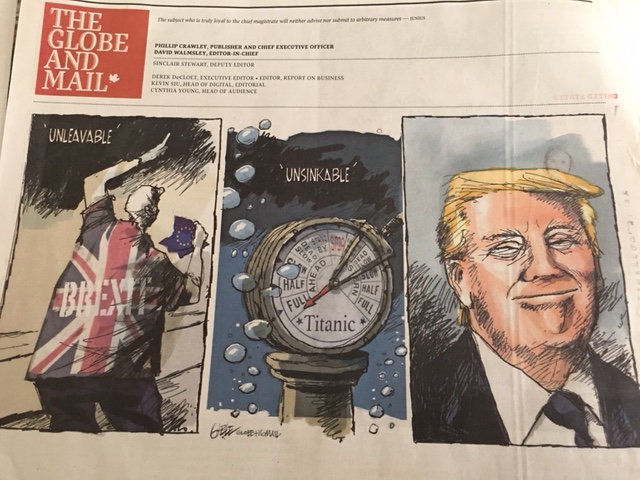We live in belief-shaking times. A recent Globe and Mail cartoon shows a man in a Brexit shirt waving a flag of the European Union with the caption ‘unleavable’, then a sketch of the Titanic’s helm with the caption ‘unsinkable’, finally a sketch of Donald Trump with no caption but the caption hangs in the air: ‘unthinkable’. This was published before the elections. The cartoon highlights the fact that our strongest assumptions about reality can be undermined by reality itself.

Why is this scary? Because there are things that we don’t see coming even though they are on their way. 20 20 hindsight is a painful condition to suffer from. What can we do about it?
Stop taking things for granted
Experience has its place. It helps us to understand and differentiate a lot of good from bad. The problem is, we live in an age of complexity where cause and effect relations no longer follow the patterns we were educated to expect. The quicker we are able to shift to a way of thinking that contemplates new possibilities beyond the obvious and the expected, the more we will be able to adapt.
For example – money and time zones
Here are two recent examples I came across that had me rethinking ‘obvious truths’. The first concerns time zones. We travel frequently at Intelligent Management and being jet-lagged is an ongoing challenge. But what if all countries had the same time zone? Just in Russia alone there are 11 different time zones.
Time zones are essentially a convention. Why not, as suggested by two American professors, adopt one big universal time? (See article ‘The Radical Plan to Destroy Time Zones’).
And what about money? There is a pilot project for universal basic income in Ontario, Canada , revolutionary enough as an idea. But what if we reconsider what money is altogether? Why do we have to use GDP as a measure of wellbeing? Why not something that that accounts for the ecological and social impact of economic activity, as suggested by Joseph Stiglitz? Even more radically, as our economies are based on debt and the assumption of continuous growth, and banks “loan money into existence”, what about a ‘new money system completely free of intrinsic debt’?
This is not a fringe proposal. It has been around since at least the 1930s, when a group of economists in Chicago proposed it as a way of curbing the reckless lending that led to the Great Depression. The Chicago Plan, as it was called, made headlines again in 2012 when progressive IMF economists put it forward as a strategy for preventing the global financial crisis from recurring.
(See To Deal with Climate Change We Need A New Financial System)
Continuous Innovative Thinking
Many organizations are familiar with the concept of Continuous Improvement. Unfortunately, today that is no longer sufficient. To survive and thrive within increasing complexity we need to cultivate the ability to continuously challenge our assumptions and continuously innovate. Assumptions can become a trap but by challenging them we have a new opportunity: take nothing for granted because that’s where innovation lies.
It’s not a skill that we all naturally have but it can be learned. The Thinking Process Tools from the Theory of Constraints trigger the kind of systemic, innovative thinking we urgently need today. We’ve been sharing them with organizations for almost 20 years. They are not for everybody, but for those who have the courage to reimagine and redesign their future, the tools provide a catalyst, a map and a reliable method to explore the unknown.
Sign up to our blog here and shift your thinking towards broader, systemic possibilities for yourself and your organization.
About the Author
Angela Montgomery Ph.D. is Partner and Co-founder of Intelligent Management, founded by Dr. Domenico Lepore. She is co-author with Dr. Domenico Lepore and Dr. Giovanni Siepe of ‘Quality, Involvement, Flow: The Systemic Organization’ from CRC Press, New York. Angela’s new business novel+ website The Human Constraint looks at how the Deming approach and the Theory of Constraints can create the organization of the future, based on collaboration, network and social innovation.





Leave a Reply